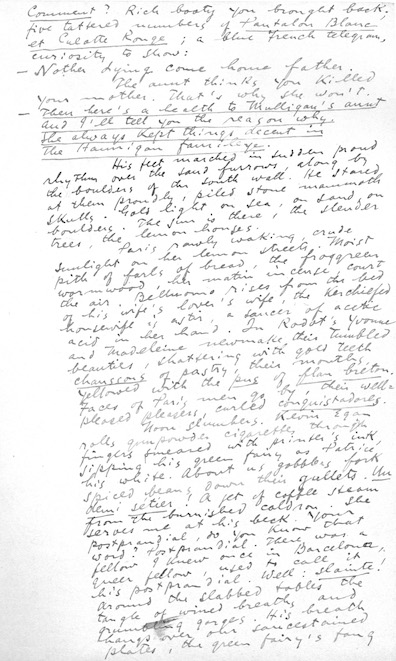In Proteus Stephen recalls how his stay in Paris was
interrupted by the arrival of "a blue French telegram,
curiosity to show: / — Nother dying come home father." All
editions of Ulysses before 1984 have "Mother," but
Hans Walter Gabler's edition of that year restores the word
that Joyce wrote in the so-called Rosenbach manuscript. An
error in a telegram that turned his mother into just "another"
person dying, or perhaps into "no
mother," would indeed make it something to show.
"Nother" is one of many changes in the Gabler text
applauded by Joyce biographer Richard Ellmann. When he
reviewed the new edition in the 15 June 1986 issue of the New
York Times, Ellmann wrote, "It appears that the famous
telegram from Simon Dedalus to Stephen did not read when
delivered to him in Paris, 'Mother dying come home father,'
but 'Nother dying come home father.' Hence it was, as Stephen
recalls, a 'curiosity to show.' The typesetters could not
believe their eyes in this instance, nor in another when the
black horn fan held by the 'whoremistress' Bella Cohen asks,
'Have you forgotten me?' and is answered, 'Nes. Yo.' They
changed it to 'Yes. No."'
Although Ellmann's biography asserts that on 10 April 1903
Joyce received a telegram at his Parisian hotel reading
"MOTHER DYING COME HOME FATHER" (128), and others have
referred to it as an actual occurrence, there seems to be no
hard evidence that such a telegram (with either spelling) was
ever sent. Gabler bases his reading on the manuscript and the
successive proofs for the first edition preserved at the Harry
Ransom Center in Austin, Texas. In a personal communication,
he observes, “I am not aware that, outside the fiction of Ulysses,
there is material evidence that James Joyce during his sojurn
in Paris received such a telegram. Richard Ellmann may
nonetheless not be far off the mark when he at this point
reconstructs James Joyce’s biography from the fiction James
Joyce wrote about Stephen Dedalus—but what he, Ellmann, says
is an extrapolation from the fiction.”
Real or imagined, it is no wonder that Joyce, so attentive to
the quirks of language, would refer to the telegram as a "curiosity."
The word calls to mind Curiosities of Literature, by
Isaac D’Israeli (1766-1848, father of the British Prime
Minister Benjamin Disraeli), a multi-volume and very popular
work that highlights the eccentric contents and backstories of
supposedly serious books of the later 18th and earlier 19th
centuries. It may be another of Stephen Dedalus’s
self-deprecating moments in Proteus that he sees
himself ending up as an anecdote in a D’Israeli-like
collection, remembered for all the wrong reasons. Truth being
stranger than fiction, Joyce does appear in a modern-day Curiosities
of Literature by John Sutherland (Penguin, 2009).
Critics have pointed out the irony of Joyce deliberately
inserting typos into a work that is notorious for its textual
corruptions. John Noel Turner, in "Miles of Porches of Ears,"
JJQ 36 (1999): 979-84, notes that the mistakes of
typesetters and others have tended to blur Joyce’s
“intentional obscurities.” Details like Bloom's "high grade ha" must be
meant to spark reflection about the production and
reproduction of words. Beyond what Joyce may be saying about
language, he clearly embraced the comic potential of errors.
In Lotus Eaters Bloom too receives a letter with a
misspelling ("that other world"), and in Eumaeus he
finds that the Evening
Telegraph has spelled his name "L. Boom.”
